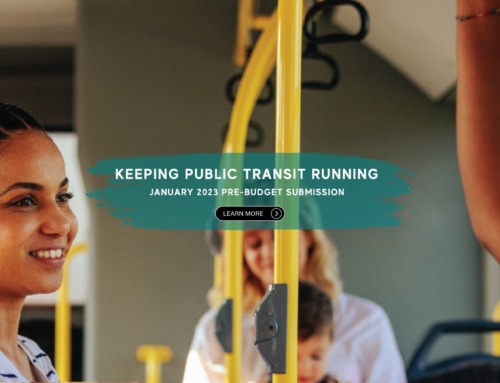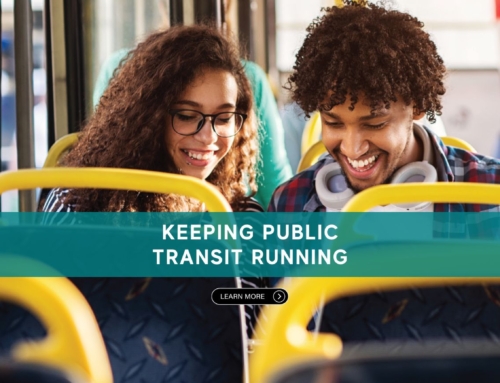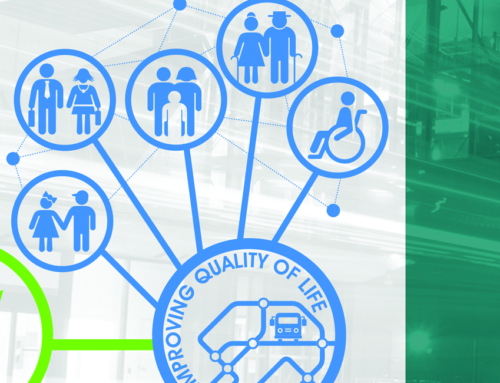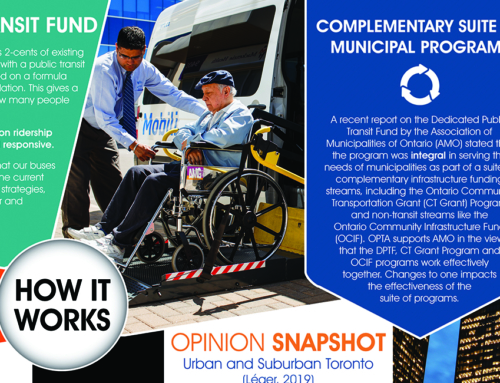Public Transit: A priority for addressing affordability, housing pressures, and population growth
March 27, 2024 – News Release
For Immediate Release
Ontario budget invests in public transit infrastructure but work to do on addressing operating shortfalls as Ontario’s population grows
TORONTO (March 27, 2024) – The Ontario Public Transit Association (OPTA) and the Canadian Urban Transit Association (CUTA) applaud the Government of Ontario for its continued support of public transit infrastructure seen in budget 2024. Notable capital investments include the Downtown Mississauga Loop, and Brampton North Extensions of the Hazel McCallion LRT.
These investments, combined with the launch of the new Ontario Transit Investment Fund and the expansion of the One Fare program, are helping to make public transit a more affordable and reliable option for Ontario’s commuters. The programs outlined in the budget reflect priorities for enhanced rural and urban mobility.
Most Ontario transit systems continue to face operating pressures. Many have resorted to increasing fares, accessing reserve funds, or cutting service.
“We’re pleased to see the government’s record support for public transit infrastructure reflected in this budget,” said Tony D’Alessandro, OPTA Chair and Director of Transit Services, Town of Milton. “As demand for transit grows, we are committed to working with the government to address operating pressures facing Ontario transit agencies.”
Ontario is experiencing rapid community growth, which increases the demand for frequent and reliable public transit.
“Investments in public transit operations are needed to maintain service levels and ensure Ontario’s communities can accommodate growth,” said Kelly Paleczny, CUTA Chair and General Manager, London Transit Commission.
As the announcement of this year’s Ontario Dedicated Public Transit Fund (Ontario Gas Tax Fund) nears, public transit agencies look forward to working with the government to see operating support that unlocks Ontario’s cities’ productivity.
-30-
Media Contact:
Jon MacMull
Director, Communications and Public Affairs
Canadian Urban Transit Association
macmull@cutaactu.ca
October 30, 2023 – OPTA’s Advocacy Day at Queen’s Park
The good news is that transit ridership is BACK to pre-pandemic levels – or higher – in most Ontario municipalities. This is true for transit agencies in rural and urban centres. But there’s bad news too – the fiscal situation facing Ontario’s transit agencies is dire, resulting in systems raising fares by double-digits, cutting services, or both. Customers returning to transit are being left at the curb. That means transit agencies are being forced to do everything you shouldn’t do if you want to increase transit ridership and make life affordable.
Ontario transit systems continue to face a combined $510M operating shortfall and are asking the provincial government to help by supplementing the total funding envelope of the Dedicated Public Transit Fund (Ontario Gas Tax Program) to a total of $700M in 2023-24 and $750M in 2024-25 to support affordable transportation for Ontarians as the province’s population grows at a record pace.
Associate Minister of Transportation, Vijay Thanigasalam recognizing OPTA’s Delegation
On October 30, 2023, OPTA held another successful advocacy day at Queen’s Park. Our goal was to build relationships and advocate for urgently needed funding for transit as a priority for addressing affordability, housing pressures, and population growth. OPTA delegates attended 16 in-person meetings with key MPPs and staff. Those discussions will now help lay the groundwork for OPTA’s pre-budget submission and further advocacy.
Thank you Associate Minister of Transportation, Vijay Thanigasalam for recognizing our delegation in the legislature.
The permanent Dedicated Public Transit Fund (provincial gas tax funding) is 10 years old this year and a victim of its own success. Many Ontario transit systems find themselves in a challenging position – back to 2019 ridership levels but having to cut services and raise fares to meet budget. Even those systems below pre-pandemic ridership levels are still experiencing growth – in off-peak hours, on their local bus routes, among students and other transit-dependent demographics. Operating support for transit is desperately needed.







